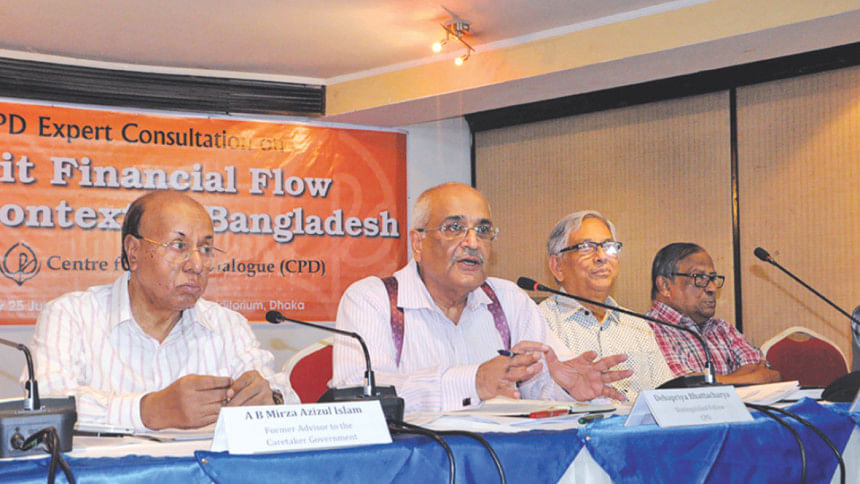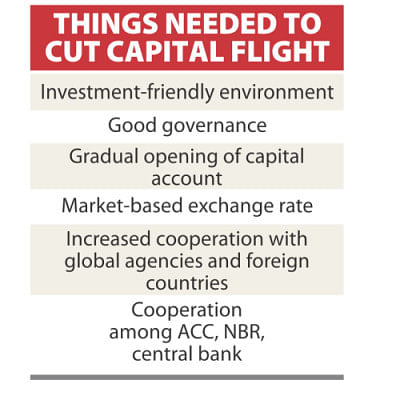Good investment climate will curb capital flight: analysts

An investment-friendly environment with good governance in place could help reduce illicit financial flows from Bangladesh, experts said yesterday.
They made the observations at an expert consultation meeting on illicit financial flows, organised by the Centre for Policy Dialogue at the Brac Centre Inn.
The experts said the gradual opening of capital account convertibility and building effective coordination among different government agencies could also help the country reduce capital flight.
Debapriya Bhattacharya, distinguished fellow of CPD, a civil society think-tank, chaired the discussion, which was attended by top economists, academicians, bankers, businessmen and government officials.
“A sense of security in terms of law and order and an investment-friendly climate can prevent the flow of money to outside,” said AB Mirza Azizul Islam, a former finance adviser to a caretaker government. Bangladesh's recent decline in ranking in the ease of doing business and the global competitiveness report also proved that the country's investment situation is getting worse.
The lack of actions or punishment where cases are detected is also encouraging outflow of capital, he added.

Mohammed Farashuddin, a former governor of the Bangladesh Bank, echoed the same about the country's investment climate.
“If there was a 100 percent pro-investment climate, there would not be any capital flight,” he said, adding that historical evidence also shows that the highest illicit financial flows had taken place during the election years, when uncertainty loomed large.
He suggested that Bangladesh should go for effective floating exchange rate before introducing capital account convertibility.
“Over appreciation of the taka through managed exchange rate also encourages the flow of illicit capital,” Farashuddin said.
Earlier, Towfiqul Islam Khan, CPD's research fellow, made a presentation on the illicit financial flows from Bangladesh. The researcher tried to clarify the issue in the context of Bangladesh.
His findings show that 88 percent of illicit financial flows from Bangladesh in the last ten years took place through trade mispricing.
During the period, the average illicit financial flows stood at $5.588 billion a year, with the highest being in 2013, when $9.666 billion flew out of the country.
The sum is about 3.6 times the education budget and 8.2 times the health budget.
“If 25 percent of this money can be taxed, the health budget could be tripled or the education budget doubled,” found the CPD study.
The third highest amount, $6.44 billion, slipped out of the country in 2008.
Interestingly, the country had been witnessing volatile political situation, centring on national elections, in both 2008 and 2013.
Akbar Ali Khan, former top bureaucrat and a former finance adviser to a caretaker government, said the capital outflows are not being fuelled by tax.
“The rich people are scared of keeping their money in the country. They think their wealth will be safe in other places.”
Khan said the Anti-Corruption Commission cannot deal with the issue on its own; rather, a separate office is required to tackle the menace.
“Illicit financial flows cannot be prevented by creating new agencies and formulating fresh laws. The governance crisis is a major issue here,” said Ahsan H Mansur, executive director of the Policy Research Institute.
Bangladesh should start capital account convertibility to reduce this illicit outflow, he added.
M Syeduzzaman, a former finance minster, touched upon the sources of illicit money.
Real estate transactions, which are shown hugely under-valued to dodge taxes, are a big source of untaxed money, he said.
Abdul Matlub Ahmad, president of the Federation of Bangladesh Chambers of Commerce and Industry, questioned the activities of too many government agencies and offices that deal with the issue of money laundering.
“Maybe they know many things on the illegal capital outflows, but they cannot do anything,” he said, without elaborating further.
He also gave an example of gold smuggling, which is being detected by the law enforcers. “But, no mastermind is yet to be caught up,” he added.
Bhattacharya said it is clear from the discussion that Bangladesh being an investment-deficit country is becoming an illegal capital-exporting country.
To address the issue, a taskforce can be formed, he added.

 For all latest news, follow The Daily Star's Google News channel.
For all latest news, follow The Daily Star's Google News channel. 



Comments